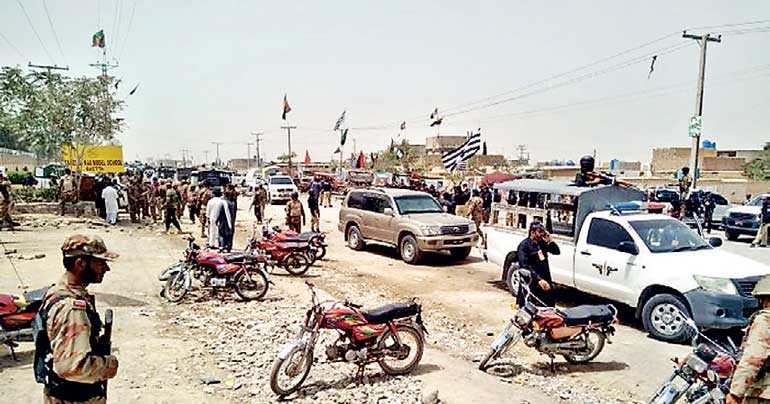Saturday Feb 21, 2026
Saturday Feb 21, 2026
Thursday, 26 July 2018 00:00 - - {{hitsCtrl.values.hits}}

Quetta/Peshawar, Pakistan (Reuters): A suicide bomber killed at least 29 people near a polling centre as Pakistanis voted on Wednesday in a knife-edge general election pitting cricket hero Imran Khan against the party of jailed ex-Prime Minister Nawaz Sharif.
The Islamic State militant group claimed responsibility for the attack in the western city of Quetta, where security sources said the bomber drove his motorcycle into a police vehicle.
A hospital spokesman said 29 people were killed and 35 others wounded in the attack that a Reuters witness said occurred near a voting centre in Quetta, the capital of Baluchistan province.
Earlier this month, a suicide bomber killed 149 people at an election rally in the town of Mastung in Baluchistan province. That attack was also claimed by Islamic State militants.
About 371,000 soldiers have been stationed at polling stations across the country to prevent attacks, nearly five times the number deployed at the last election in 2013.
According to the latest opinion polls, neither Khan nor Sharif are likely to win a clear majority in the election.
Khan has emerged as a slight favourite in national opinion polls, but the divisive race is likely to come down to Punjab, the country’s most populous province, where Sharif’s party has clung to its lead in recent surveys.
The election has been plagued by allegations the powerful armed forces have been trying to tilt the race in Khan’s favour after falling out with the outgoing ruling party of Sharif, who was jailed on corruption charges this month.
“Imran Khan is the only hope to change destiny of our country. We are here to support him in his fight against corruption,” said Tufail Aziz, 31, after casting his ballot in the north-western city of Peshawar.
About 106 million people are registered to vote in polls due to close at 6 p.m (1300 GMT). The likely winner should be known by around 2 a.m. on Thursday.
Whichever party wins, it will face a mounting and urgent in-tray, from a brewing economic crisis to worsening relations with on-off ally the United States to deepening cross-country water shortages.
An anti-corruption crusader, Khan has promised an “Islamic welfare state” and cast his populist campaign as a battle to topple a predatory political elite hindering development in the impoverished mostly-Muslim nation of 208 million people, where the illiteracy rate hovers above 40 percent.
“This is the most important election in Pakistan’s history,” Khan, 65, said after casting his vote in the capital Islamabad.
“I ask everyone today – be a citizen, cherish this country, worry about this country, use your vote.”
Khan has staunchly denied allegations by Sharif’s Pakistan Muslim League-Nawaz (PML-N) party that he is getting help from the military, which has ruled Pakistan for about half of its history and still sets key security and foreign policy in the nuclear-armed nation. The army has also dismissed allegations of meddling in the election.